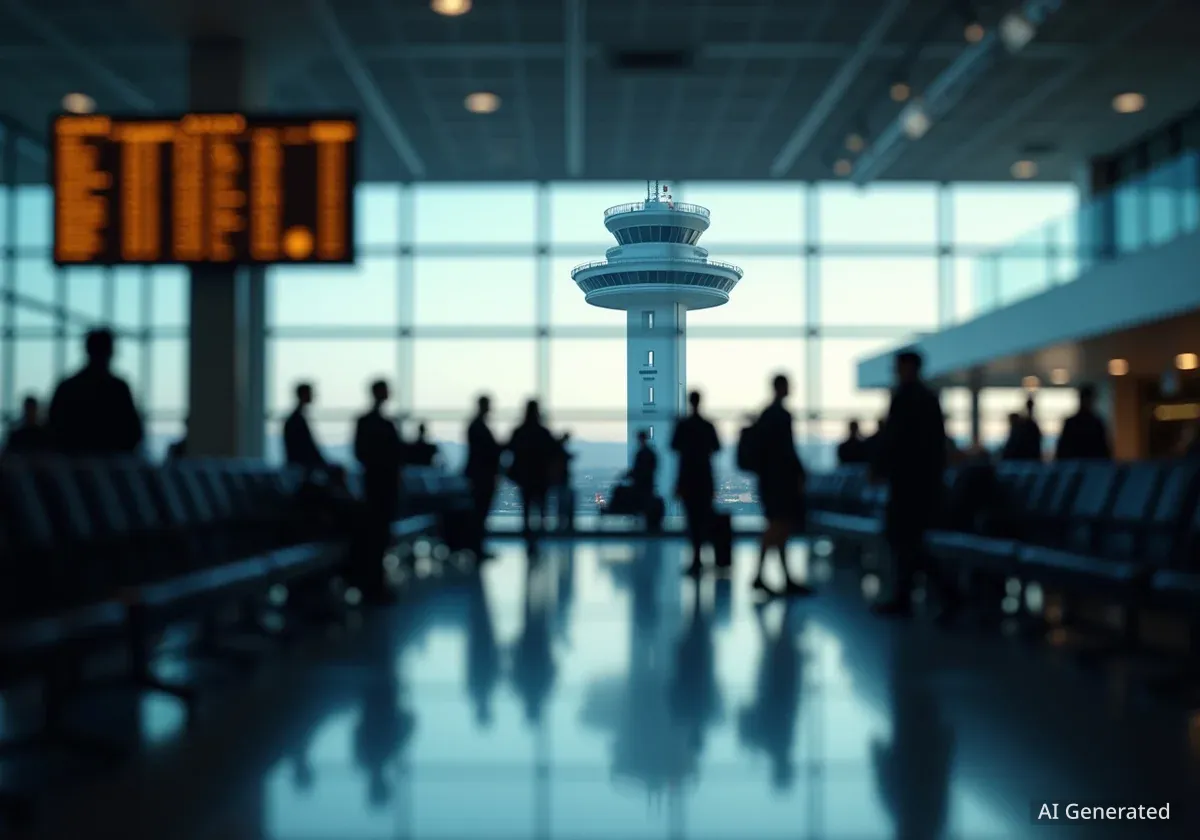Operations at Hollywood Burbank Airport faced significant disruptions, including extensive flight delays, after a shortage of air traffic controllers on Monday. The staffing issue is directly linked to an ongoing federal government shutdown, which has left essential federal employees, including controllers, working without pay.
Full staffing in the airport's control tower was expected to resume Tuesday morning. However, the incident highlighted the growing impact of the shutdown on the nation's aviation infrastructure, raising concerns about safety and system stability.
Key Takeaways
- Hollywood Burbank Airport's control tower was unstaffed for nearly six hours on Monday evening.
- Air traffic was managed remotely by a facility in San Diego, leading to major delays.
- The FAA reported that flights bound for Burbank experienced delays averaging 151 minutes.
- The staff shortage is attributed to air traffic controllers calling in sick while being forced to work without pay during a government shutdown.
- Officials have warned that the aviation system could see more widespread disruptions if the shutdown continues.
Control Tower Empties Amid Staffing Crisis
On Monday, from 4:15 p.m. to 10:00 p.m., the control tower at Hollywood Burbank Airport had no air traffic controllers physically present. During this nearly six-hour period, the complex task of managing takeoffs and landings was transferred to a remote team.
The Southern California TRACON (Terminal Radar Approach Control), based in San Diego, assumed control. While TRACON facilities are designed to manage air traffic across large regions, local tower controllers provide crucial visual oversight of runways and taxiways.
What is TRACON?
TRACON facilities handle aircraft departing from and arriving at airports within a specific airspace. They manage the flow of traffic between the high-altitude routes overseen by en-route centers and the local control handled by airport towers. Relying solely on TRACON for airport operations is an unusual measure implemented during staffing emergencies.
The immediate consequence for travelers was severe disruption. The Federal Aviation Administration (FAA) issued advisories confirming that departures to Burbank Airport were delayed by an average of 151 minutes. The ripple effect caused planes to still be taking off as late as 11:00 p.m., an hour past the airport's voluntary 10:00 p.m. curfew.
Travelers Voice Frustration and Safety Concerns
Passengers caught in the delays expressed a mix of frustration and unease. The absence of local controllers in the tower was a point of concern for many who were waiting for their flights.
"You'd like to have somebody local that can see what's going on, visually, right?" said Kimberly Riddle, a traveler from Tracy, California, highlighting the importance of on-site personnel.
Others, like influencer Salice Rose, were frustrated by repeated delays. "See, if mine gets deleted one more time, I might just head back home. I can't. I'm not going to sit here and wait," she said after facing multiple postponements.
Shutdown's Impact on a National Scale
The situation at Burbank is a symptom of a larger national problem. Air traffic controllers are among the essential federal employees required to work during a government shutdown but do not receive their regular paychecks. This has led to an increase in sick calls across the country.
Then-U.S. Secretary of Transportation Sean Duffy acknowledged the trend in a statement on Monday. "We are tracking sick calls, sick leave. Have we had a slight tick up in sick calls? Yes," he confirmed. Duffy emphasized that safety remains the top priority, even if it means reducing air traffic flow to match available staffing levels.
Nationwide Strain: The United States employs approximately 11,000 air traffic controllers. Even before the shutdown, the FAA was already facing a shortage of about 3,000 controllers, making the system more vulnerable to staffing disruptions.
The FAA's advisories on Monday also indicated staffing-related delays at major airports in Denver, Detroit, Indianapolis, and Phoenix, showing that the problem was not isolated to Southern California.
Expert Warns of a More 'Brittle' System
Aviation experts warn that the longer the shutdown persists, the greater the risk to the stability of the national airspace system. The financial strain on unpaid workers, including both air traffic controllers and Transportation Security Administration (TSA) employees, is a growing concern.
Jeffrey Price, a professor of aviation at the Metropolitan State University of Denver, explained the potential for escalating problems. "The system does become a little bit more brittle, and the longer this goes, the more the traveler is going to notice it," Price stated.
This situation mirrors the 35-day government shutdown of 2018-2019. During that period, an increase in TSA officers calling in sick led Miami International Airport to temporarily close an entire terminal. Air traffic controllers also sued the government in an effort to receive their pay.
The Political Context
The shutdown has become a point of political contention. California Governor Gavin Newsom directly blamed the administration for the disruption at Burbank. In a social media post, he wrote, "Burbank Airport has ZERO air traffic controllers from 4:15pm to 10pm today because of YOUR government shutdown."
The political stalemate in Washington continues to affect thousands of federal workers. While controllers were expected to receive one final partial paycheck for the period worked before the shutdown began, their future earnings remain uncertain until the government reopens. This uncertainty is the primary driver behind the staffing shortages now impacting air travel nationwide.





